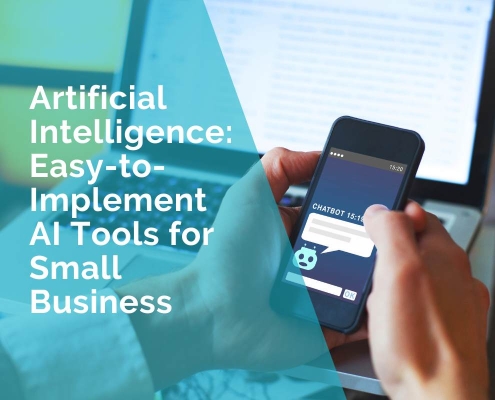What Can You Do With a Degree in Information Technology?
With digital technologies being integrated across virtually all industries and sectors, a degree in ICT (Information and Communication Technology) may actually be amongst the most versatile qualifications for young graduates today. With even just a Cert III or IV in Information Technology, young professionals can qualify for ICT support roles in a variety of industries and working environments. Undergraduate and postgraduate students can walk through even more doors, with opportunities to join dedicated ICT agencies and even take on consultancy roles.
Today, ICT qualifications are also becoming more accessible for students worldwide. For instance, you can study a Master of Information Technology online while balancing full-time work. And as ICT careers are reliant on continuous learning and upskilling, it’s also common for employers to allocate budget towards staff training and education – so you may not only be able to study at your own pace, but also have your upskilling journey supported by your workplace.
Whether you’re already studying ICT or are planning to do so, it’s common to ask yourself what potential career pathways await you post-graduation. Below, we’ll be outlining some of the top professions that you can pursue with both undergraduate or postgraduate qualifications in information technology.
Web Development
Web development is one of the most straightforward career paths for anyone studying ICT. As a developer, your primary responsibilities will be to build new websites and work with existing ones. This makes web development an ideal ICT career pathway for anyone interested in business, web design, and digital marketing.
For web developers, a degree in ICT will equip them with a broad base of knowledge about fields like networks, operating systems and cybersecurity. You should also be familiar with several programming languages, including HTML and CSS, Python, and JavaScript.
To kickstart your career and enter the web development market, students may opt to take on freelance work for small business owners (i.e., supporting clients in building and maintaining websites) or seek an in-house internship at a digital agency for a more structured industry learning experience.
For those looking to enter the world of freelancing, keep in mind that you’ll be responsible for sourcing your own clients and will need to be more proactive when it comes to setting deadlines and suggesting improvements to their websites, whether these improvements come in the form of integrating new AI features or debugging a page that isn’t working. You can learn a lot from this level of autonomy, however, and employers will always appreciate the self-driven motivation that accompanies an entrepreneurial spirit.
SEO & Digital Marketing
Modern web development is now tightly linked to digital marketing. A well-built website is fundamental to every digital strategy, which means developers often collaborate with SEO specialists, content creators and marketing managers to make sure that sites perform well technically and strategically. Page speed, mobile optimisation, structured data and security certificates (HTTPS) all affect how a website ranks on Google, and optimising them can increase website traffic.
ICT graduates who understand both coding and digital marketing principles are in especially high demand. Knowing how to track user behaviour through Google Analytics, integrate marketing pixels or set up API connections to CRM systems can make you invaluable to businesses that rely on data-driven insights. Many developers even go on to specialise in conversion rate optimisation (CRO), which is a field that combines web design and analytics to improve how users interact with websites.
In short, a background in ICT opens doors beyond coding. It can enable you to become a versatile digital professional who can design, maintain, and strategically grow an organisation’s online presence. Whether you work for a startup or a large agency, your ability to bridge technology and marketing can define your success in the digital world.
UX/UI Design and Front-End Specialisation
Another exciting subfield within web development is UX (user experience) and UI (user interface) design. These areas focus on how users interact with digital platforms, blending creativity with technical precision. ICT graduates who have an interest in things like visual design, usability testing, metric tracking or accessibility often find UX/UI work particularly rewarding.
UX/UI specialists research how users navigate websites and apps, run prototype tests and refine layouts to make digital products intuitive and enjoyable. Front-end developers, meanwhile, bring these designs to life through coding languages such as HTML, CSS and JavaScript frameworks like React or Vue.js.
What’s great about these roles is that, these days, businesses are realising that good design directly impacts customer satisfaction and conversion rates. As a result, the importance of UX/UI design is at the front of mind in the tech world. Information technology students and graduates can build a strong foundation in this area by learning design thinking methodologies, experimenting with prototyping tools like Figma or Adobe XD, and developing a keen eye for user feedback.
Combining web development skills with UX/UI knowledge allows you to deliver seamless, aesthetically appealing and functional experiences – a combination that’s invaluable in both agency and in-house development roles.
Cybersecurity
With its dynamic range of challenges and unique knowledge base, cybersecurity is an ideal career pathway for ICT graduates that are keen to keep learning every day. The global rise in cyber threats like phishing, malware and DDoS attacks has also made cybersecurity specialists highly sought after, so job security is another quality that makes this pathway attractive to young graduates.
As a cybersecurity specialist, your role will be to set up safeguards against the most common digital threats and help businesses respond in the event of a cyberattack. For example, you’ll use your knowledge of networks and servers to set up airtight firewalls against viruses. You’ll also be tasked to conduct regular cybersecurity audits and prepare reports detailing vulnerabilities and suggested corrective action measures.
Cybersecurity specialists play a vital role in data security and management as well, so you can expect to partner with data specialists across your career (i.e., in setting up secure databases and running diagnostics on data-based workflows like harvesting and extraction methods).
ICT Project Management
As you gain experience in your ICT career and begin to consider career progression, you can look to pursue managerial roles like an ICT project manager position. In this job, you’ll be overseeing specialists such as developers and designers in completing dedicated ICT projects, whether that’s migrating a website to a new platform, building one entirely from scratch, setting up a digital database or a company intranet, or a wide variety of other network- or digital infrastructure-based projects.
As an ICT project manager, the two main methodologies you’ll need to know are waterfall and agile. The waterfall method is a more linear approach with definite timelines and a concrete step-by-step roadmap. The agile method, on the other hand, is much more flexible and allows for changes to be made throughout the duration of the project. Agile also relies on continuous feedback and quick implementation of changes in order to succeed.
Given that you’ll already be equipped with the technical knowledge to facilitate and oversee large projects, learning various project management methodologies will set you up to adeptly manage a wide variety of ICT projects.
ICT Entrepreneurship
Finally, as an ICT graduate, you also have the option of starting your own business. If this business involves software, then your skills will come in handy when designing the initial product and troubleshooting potential problems. What’s more, your ICT background will also be extremely attractive to other entrepreneurs who might be looking for a co-founder.
Even if your business isn’t directly software-related, your technical skills will still come in handy. For example, as an ICT graduate, you’re probably familiar with a variety of business management software, like project management tools, for instance. You can use this knowledge to select the most appropriate tools for your company and help your team utilise them to their full potential.
Your strong ICT background will also help you develop your business’s website or app, whether you’ll be building up these digital assets wholly independently, or hiring a team of developers to help you out. No matter what sort of business you decide to run, a background in ICT will give you a head start in many areas where non-technical founders might struggle.
For ICT Professionals in the Digital Age, the World is your Oyster
As an ICT graduate, the world really is your oyster. There are countless potential career paths you can take, including but not limited to being a web or app developer, a cybersecurity specialist, a project manager or even a founder of your very own tech startup. You can also focus your skills towards marketing, specialising in disciplines like SEO, digital advertising, or even across UX and UI. Plus, because more businesses across all industries are growing more reliant on digital investments, knowledge of the digital landscape and foundational skills like website management is ideal not only for bolstering your CV, but also for driving your own entrepreneurial professional goals – if starting your own business is a goal you want to work towards yourself. With the right skills, you can even side-step traditional jobs altogether and create your own digital product, like a SaaS offering.
And while each of the career options we’ve outlined above might require further training both upon commencement and periodically throughout your career, foundational industry qualifications can still equip you with the learning frameworks and vocabulary that you need to continue driving your own learning in the digital age. So why not get a few ICT qualifications under your belt to keep all of these doors open for you?
***
Author Bio: Ainsley Atinon is an SEO specialist and content writer with a background in marketing and communications. He has experience in crafting big-picture SEO plans, writing specialised content for a wide range of industries, and investigating technical SEO issues. He has worked with clients in many different industries, ranging from cybersecurity to fashion and based both in Australia and abroad.












